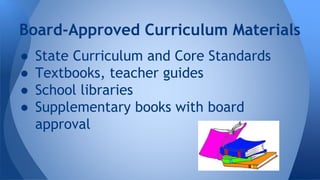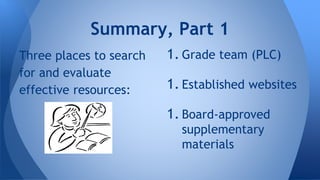Searching for and Evaluating Resources
- 1. Finding Resources: A Brief Teacher Guide
- 2. Assessment #3 Instructor: Shawn Robbins Presentation by Teresa Hopson December 7, 2014
- 3. Teachers can locate resources from the following:
- 4. Board-Approved Curriculum Materials ● State Curriculum and Core Standards ● Textbooks, teacher guides ● School libraries ● Supplementary books with board approval
- 5. Supplemental Materials ● Can be cross-curricular ● Can add variety ● Can target known interests ● Can replace weak resources
- 6. Supplemental resources include: ● Professional Learning Communities ● Your grade team ● Online interactive sites ● Poems and songs ● Pre-viewed, approved film and video
- 7. Three examples of where teachers can find and use resources to extend pedagogical and content knowledge: 1. Professional Development workshops 2. Memberships to blogs or educational societies 3. Instructional coaches and curriculum supervisors
- 8. Specific examples to extend pedagogical and content knowledge: ● Penna. Dept. of Education SAS website ● Act 48 classes ● Scholastic’s Instructor magazine ● Content-specific websites such as Edutopia and Khan Academy ● Other members of PLC such as art and technology instructors
- 9. Finally, here are two ways to use non-instructional resources for students: 1. Death and other traumatic events may require the teacher to invite the counselor to a session with a student or students. 2. Children are unable to learn with poor nutrition, so the teacher may need to request class visits with the nutritionist.
- 10. Summary, Part 1 Three places to search for and evaluate effective resources: 1. Grade team (PLC) 1. Established websites 1. Board-approved supplementary materials
- 11. Summary, Part 2 Three ways to find and use resources to extend pedagogical and content knowledge: 1. PDE SAS website 2. Professional development workshops 3. Instructional coaches, mentors, and curriculum specialists
- 12. Summary, Part 3 It really does take a village, so please utilize non-instructional staff (counselor, nurse, and other learning support specialists) to aid in the students’ learning process.











